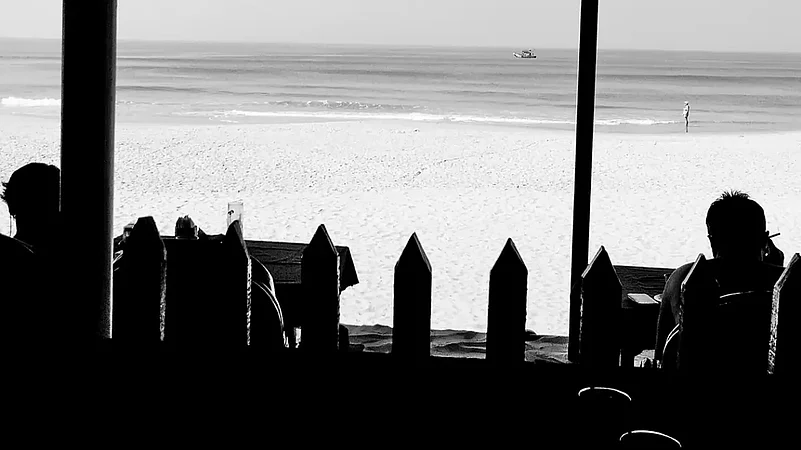So you must not be frightened, if a sadness rises in front of you, larger than any you have ever seen; if an anxiety, like light and cloud-shadows, moves over your hands and over everything you do. You must realise that something is happening to you, that life has not forgotten you, that it holds you in its hand and will not let you fall.
Rainer Maria Rilke, Letters to a Young Poet
For a long time, nothing was happening to me. Night after night, I was up on my bed, searching for purpose in the loud silence of darkness. I would grasp at strands of yearning, weave them into my story, my life, to find a turning point that would give me meaning. I was not sad. Not really. Sadness is a strong emotion, which foretells the arrival of happiness, or at least acknowledges its impermanence.
These days, to talk about sadness is to invite a conference of voices, all offering a prognosis for everything that is wrong with you. In a world where everyone tries hard to be positive and strive for something called happiness, sadness has become a symptom of personal failure. There are types of sadnesses still acceptable. Passing sadness. The dying of a parent or the loss of love. The ones you can cope with. The ones measured in grief. The ones you will recover from. The other sadnesses remain forbidden. Sadness which is a lake not a river. Which we construct within us through years of building walls. Sadness which has the sound of permanence. It doesn’t exist just to validate the arc of your story.
Deep down, we fear something about it. We probably don’t fear sadness itself. Maybe we are afraid that this sadness will lead us
nowhere. We are afraid that despite all the sadness, all the suffering, all our experiences will turn into nothing. It will leave us with nothing to show for. What if there is a miscalculation in the register of births and deaths and we are born again only to suffer? A nobody. What if we muddle through the sea of sadness never to find a happy ending? What if despite all this turmoil, all the churning within, we produce no art worth remembering. That is the fear that breaks us. Denial seems to be the only way forward.
‘You should try some spirituality.’ When you leave yourself vulnerable, open to the idea of sadness, it bothers people. Strangers come knocking over with some advice as if you had the flu. Drink a lot of water. Do yoga. Seek therapy. I drink a lot of water. I do yoga. I seek therapy. I even try some spirituality whenever it’s available in the market. My audiobooks are full of mystics trying to explain to me that there is nothing in the world, nothing worth it. There are too many monks trying to explain Buddhism to me. I am constantly shuffling between aniccha (unwillingness) and dukha (sorrow) finding it difficult to embrace either, even though one of them is now part of my name. The only thing I embrace is the lack of clarity and confusion that comes along with it.
It is no surprise that Rilke was driven by his spirit when he wrote Letters to a Young Poet. A spirit walking between the world of materiality and that of religion. A desperate attempt at finding meaning in sadness, of reward and compensation, where belief begets hope. It is easy to forget how hope is a beautiful thing. It allows you to experience things you might never actually experience in life. It encourages you to plan and dream. And there is no hope when there is no acknowledgement of sadness. What is a happy person supposed to be hopeful about?
I also embrace everyday melancholy. As a person with a disability, I am not exactly expected to be a happy person. Yet I am expected to be productive. I am expected to inspire. I am expected to smile to make others feel better about their lives. It is not surprising that many disabled people use radical joy to counter this ableist gaze. I don’t mind accepting that it’s hard for me. Everyday things are hard. To walk, to travel, to work. There is so much solidarity and sharing that comes out of just saying to each other, ‘I am not doing well’. Just saying that helps me build communities around me.
Being vulnerable also allows me to be open to new people and ideas. It allows me to create, write poetry, and experiment with new art forms. In that way, I am not very different from the artists and creators who have come before me. Vincent Van Gogh wrote to his brother Theo about something he called ‘active melancholy.’ He writes, “So instead of giving in to despair, I chose active melancholy, in so far as I was capable of activity. In other words, I chose the kind of melancholy that hopes, that strives and that seeks, in preference to the melancholy that despairs numbly and in distress.”
Van Gogh comes from a long tradition which embraces the different facets of human emotions to produce moving and everlasting art. Different forms of art and expression have embraced melancholy across space and time. Films, music, art and the stories behind them have had everlasting effects on us, partly because their melancholic longing resonates with us.
In today’s world, as capitalist work culture and consumerism takes over our lives, we run away from everything deemed melancholic as if it were an infectious disease. Why watch a movie that makes you sad when you can feel the rush of adrenaline? Why be sad when you can buy a new useless product and be happy? Why be sad when you can work 10 hours a day and have no time to be sad? Why be sad when you can have muscles? In today’s world, it almost seems as if things that don’t serve our faculties of dopamine production are not worth experiencing.
Social media has only made this worse. The compulsion to project our lives in a certain way is putting us out of touch with our feelings. This denial and avoidance trickles down to our daily lives, leaving many of us incapable of accepting or dealing with things we are dealing with. We are so eager to say that everything is right with us, that the sun is always shining, that we deny others the chance to open up and be vulnerable. The world has become more about how people see you than how you really are. We write things we don’t mean and we mean things we don’t say. It gets too much for one. There are times I want to just be vulnerable, even if it only produces silence. Things to share openly on social media. Things I want to say to people who were once close to me. Not write ‘Warmly’ when I do not feel the warmth. Not write ‘With love,’ when there is nothing to give. To not ask them if they are doing well when I am uninterested in their wellness.
Things I want to write in an email:
Hope you are well
Not too well. Not the kind of well that becomes uneasy after a point. Which carries the aura of a tragedy being foretold. Just well enough to never have to tell yourself, “Am I doing well? I must be. That’s the right answer.”
Hope you are well
Well enough not to write a poem about every flower that you see. Well enough to write poems for a few of the flowers. Well enough to embrace gazing at the sky. Well enough not to feel small after gazing at the sky.
Hope you are well
Well enough not to write, ‘I am doing well, how about you?’ Not fall apart when you think about choices you have made. If you feel the burden of being well is too heavy for you, be unwell. And don’t reply to this mail.
(This appeared in the print edition as "Active Vulnerability")
(Views expressed are personal)
Abhishek Anicca is a Patna-based writer, poet and performer






















